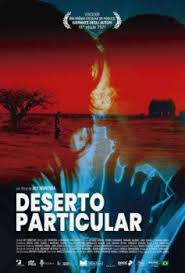
PRIVATE DESERT
Brazil, 2021, 121 minutes, Colour.
Antonio Saboia, Pedro Fasanaro, Thomas Aquino.
Directed by Ali Muritiba.
A film from Brazil which challenges issues of masculinity, male identity, transitions. It has received more than 60 nominations and awards.
The first part of the film focuses on the policeman, under suspension because of a violent incident in which he injured a rookie, media headlines and videos, officials preparing him for a trial and suggesting psychological assessment. In the meantime, he lives at home, looking after his aged father with great care. Yet some help from his student sister.
However, he keeps trying to ring Sarah, with whom he had a relationship in the past. She does not answer. He decides then to travel a thousand kilometres north to find her, putting up notices and photos in the street, eventually meeting her contact.
The second part of the film focuses on Sarah, the audience discovering that Sarah is really Robson, a young man, working hard on a building site, gay, cross-dressing. Robson is persuaded to come to a club as Sarah and encounter Daniel that rushes away. Robson has had difficulties with his parents, but is cared for by his grandmother at home, a religious woman, church meetings, and referral to a pastor who had had similar experiences to Robson in his past.
While the film shows Daniel and his obsession with his relationship with Sarah, there is the drama of his eventual discovery of the truth and his reaction. Which, of course, is the Daniel challenge of the film. Robson’s future is also the other challenge of the film.
The screenplay highlights the difficulties but also offers some kind of resolution.
- Whose desert? Daniels? Robson’s?
- Nominations and awards for the film, more than 60? Acclaim in Brazil?
- The structure of the film: the first half focusing on Daniel, the long opening sequence of him raining, voice-over, life at home, his father, his sister, care? The crisis at work? His contact with Sarah, the phone calls? His driving to find her? The second half of the film, the focus on Robson, his identity, at home, the religious background, the interactions with Daniel?
- Daniel’s world, the scenes at home, his care for his father, the detail, feeding, washing, driving? His sister, her studies, her care for her father, her attitudes, relationships? Daniel asking for work, his friend at the police? The incident, the injury to the rookie, the interviews with the police chief, the court case, suggestion of psychiatric investigation? Daniel, his age, the past and memories of Sarah?
- His decision to leave, the long drive, arriving in the town, asking people, the printout of the photos, distributing them? The phone call from Fernando? The meeting, the discussion, the ferry, Robson sitting on the boat near Daniel? The wordplay and interactions with Fernando? The meeting at the club, Robson as Sarah, escaping? The effect on Daniel?
- The revelation of Sarah, Robson, the background story, his sexual identity, living with his grandmother, the discussions on the beach with Fernando, Fernando as a friend, gay, the salon, going to the church, the preacher, his being referred to the Minister with a similar past? At work, the tough work, construction sites?
- The effect of the previous encounter with Daniel, his coming to Daniel, the dress and the wig, the kissing, Daniel discovering the truth? The effect on Daniel, the shock? The effect on Robson? Daniel demanding the dress back? Robson disrobing? Daniel leaving?
- The further complications, the threat to revealing the truth about Robson? The support of his grandmother? The decision to leave, going to the bus station, the tickets? Daniel arriving, Fernando telling him where he was? The encounter, the passion? Robson leaving on the bus? Daniel and his future?
- The Brazilian setting, universal themes, sexual identity, transitions? Brazilian male culture and dealing with the issues of this film?